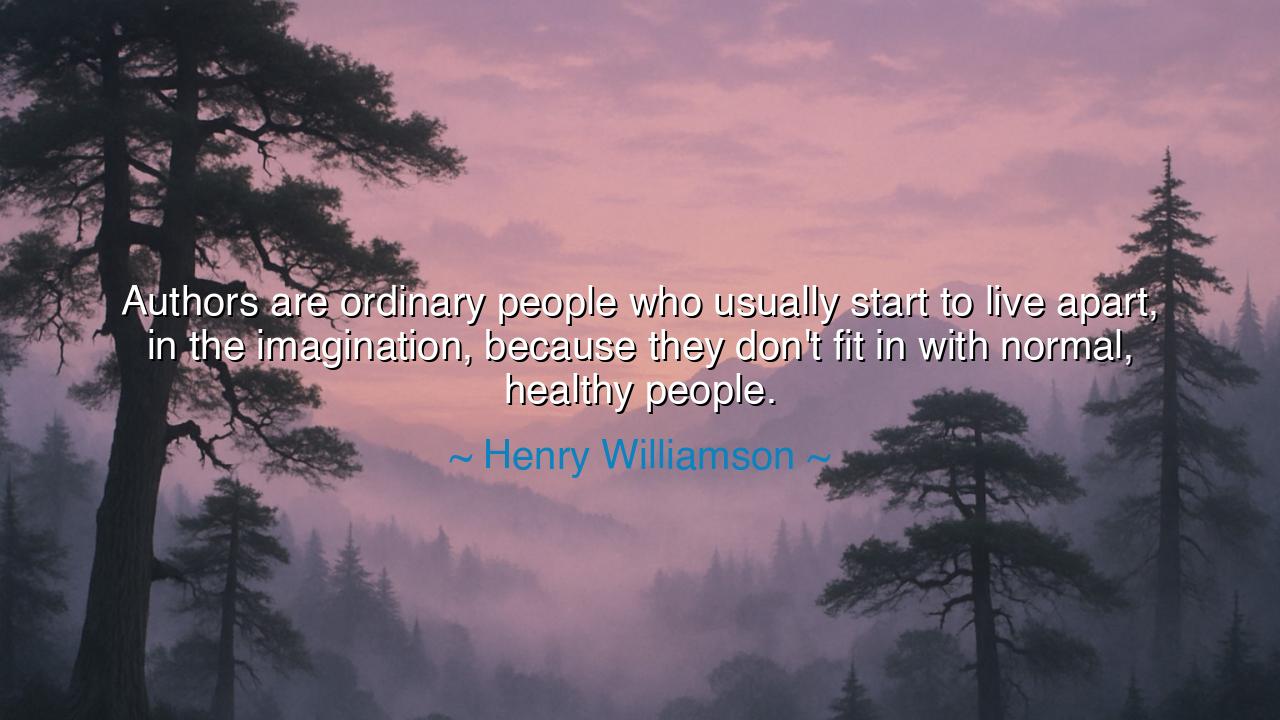
Authors are ordinary people who usually start to live apart, in
Authors are ordinary people who usually start to live apart, in the imagination, because they don't fit in with normal, healthy people.






“Authors are ordinary people who usually start to live apart, in the imagination, because they don’t fit in with normal, healthy people,” wrote Henry Williamson, the English novelist best known for Tarka the Otter, a man whose pen flowed with both the beauty of nature and the melancholy of isolation. In these words lies a confession and a revelation — that the writer is both one of humanity and apart from it; that while born of common soil, he walks often in invisible realms. For the author is the watcher on the hill, the dreamer who cannot rest within the world as it is, and so builds another within the boundless kingdom of imagination.
Williamson speaks not in arrogance, but in sorrowful wonder. To be a writer, he implies, is to feel too sharply, to observe too deeply, to be both drawn toward life and exiled from it. The ordinary person may find contentment in the rhythms of daily existence, but the author’s spirit stirs restlessly; he sees patterns and meanings where others see mere events. He lives apart, not by choice, but by necessity — for his mind hungers for a world larger than the one before his eyes. This separation is both gift and wound: it grants him vision but denies him ease.
The imagination, for such a soul, becomes both refuge and realm. It is there that the author speaks with ghosts, wrestles with angels, and gathers the unspoken thoughts of mankind. In the silence of solitude, the writer listens to voices no one else hears — the murmuring of memory, the pulse of lost centuries, the whispers of unborn worlds. It is not madness, though it sometimes feels like it; it is creation, the act of giving form to the formless. Yet because this inner life is so vivid, the outer one can feel pale by comparison, leading the author to drift ever further from the company of the “normal, healthy people” who live more simply in the tangible world.
Consider Emily Dickinson, the quiet poet of Amherst, who seldom left her home and yet traversed the vast cosmos within her verse. To her neighbors, she was reclusive, strange — a woman apart. But through her imagination, she spoke to eternity. “There is no Frigate like a Book,” she wrote, and indeed, her small room became a vessel of infinite travel. She was not “normal” by worldly standards, nor “healthy” in society’s terms, but her isolation became her strength, her solitude her sanctuary. In her distance from others, she touched the universal. She proved Williamson’s truth: that the writer, though set apart, speaks most profoundly for all.
There is tragedy and triumph in this destiny. The author’s inward life burns so brightly that the world sometimes feels dim beside it. Friendships may fade; love may falter; the demands of ordinary life may seem a cage too small for such a spirit. Yet it is precisely this tension — between the inner and outer worlds — that feeds the fire of literature. The author suffers separation so that others might feel connection. He descends into loneliness that his readers might find themselves less alone. Through his words, he reenters the world, not as an outcast, but as a messenger.
Williamson’s words, therefore, are not a lament, but an illumination. He invites us to see that imagination is both the burden and the blessing of those who cannot fit neatly into the molds of society. It is the gift that transforms alienation into art, estrangement into empathy. The writer’s distance is not rejection, but perspective — the space from which he can behold humanity as a whole, and translate its pain, joy, and longing into the eternal language of story.
Let this be the teaching: do not fear the solitude of imagination, nor despise the feeling of not fitting in. For from such disquiet is born the voice that moves nations, the song that heals, the tale that endures. If you, too, live apart — dreaming when others sleep, questioning when others accept — know that you walk the ancient path of those who gave the world its myths and its meaning. Cherish your difference, and tend the flame within. For as Henry Williamson reminds us, it is often those who stand outside life who see it most clearly — and in seeing, give it back to the world in light.






AAdministratorAdministrator
Welcome, honored guests. Please leave a comment, we will respond soon